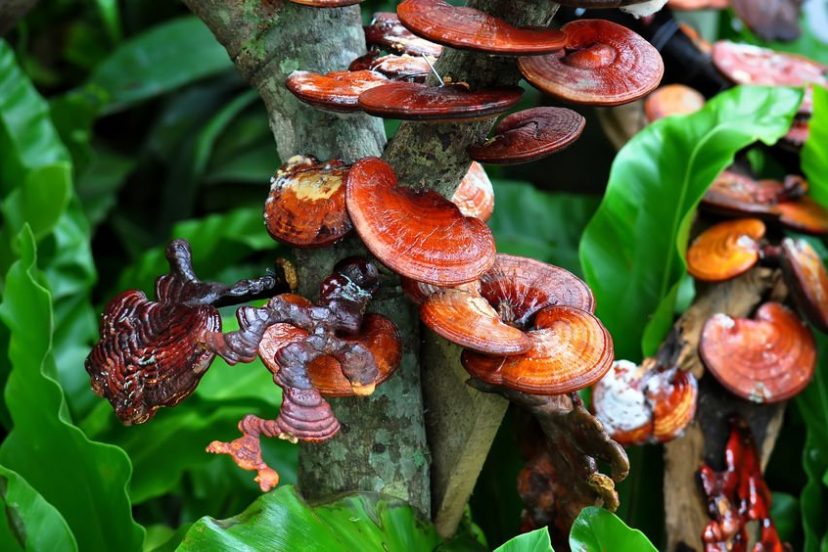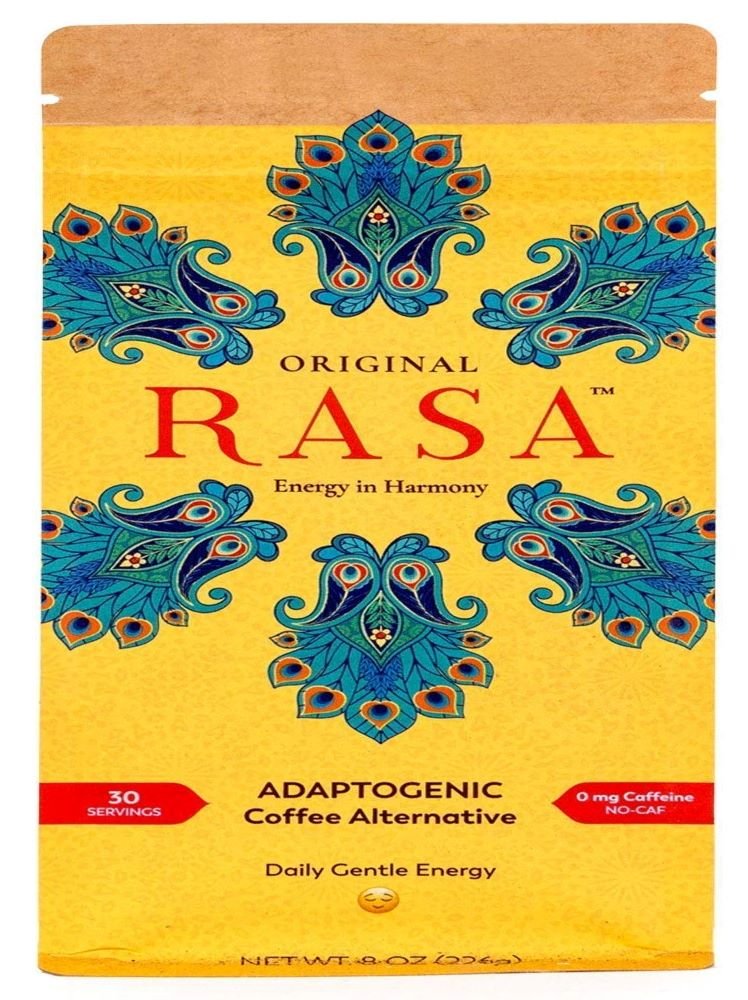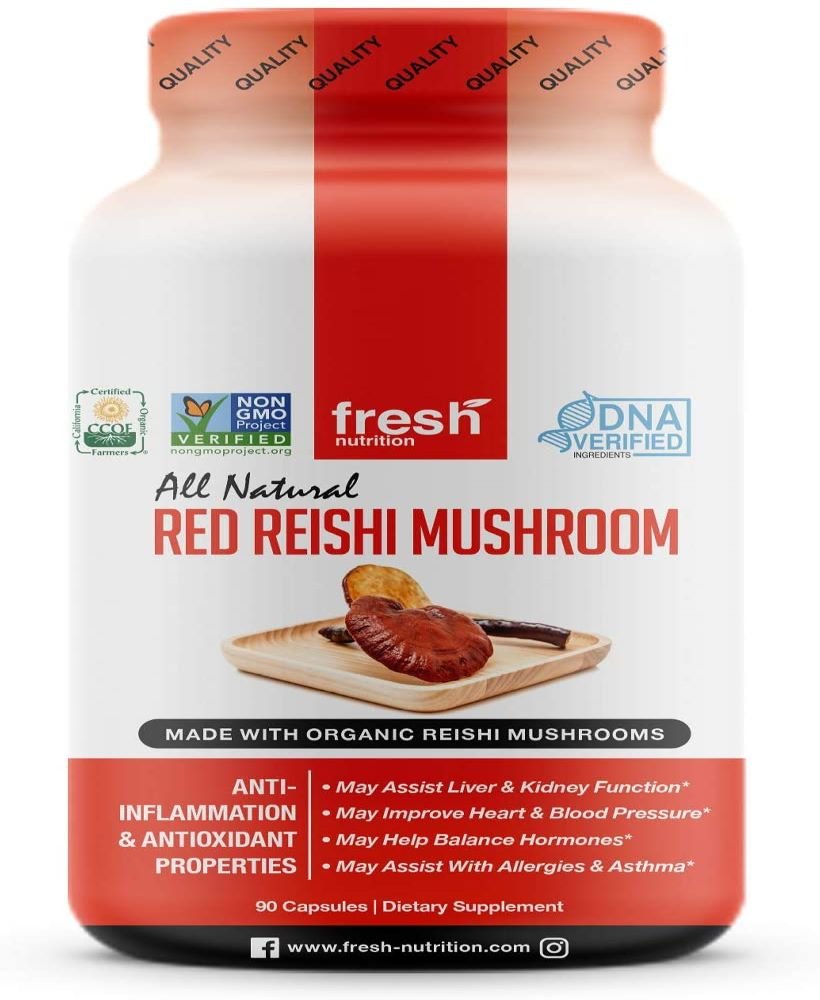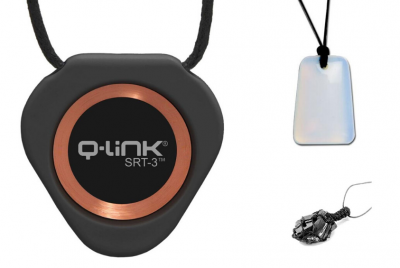When worn correctly, both Bluetooth and wired earbuds offer a lightweight and comfortable way to listen…
Does Reishi Offer EMF Protection?

*We may earn a commission for purchases made using our links. Please see our disclosure to learn more.
You may have heard of Reishi before. This superfood has been popping up more and more lately, in everything from health drinks to lotions. Some even say that this magic mushroom has the ability to protect the body from the effects of radiation.
With that in mind, it’s natural to wonder what the implications might be for EMF radiation. To help answer that question, we’ll first dive into what Reishi is and its benefits. We’ll go over the existing body of scientific evidence supporting Reishi’s use in cancer treatment, and then go into the implications for EMF radiation. We’ll also discuss some of the best Reishi products on the market today.
What is Reishi?
Reishi is a type of mushroom. This kidney-shaped fungus has many reported health benefits, and it’s often used in Eastern medicine for a variety of purposes. Reishi is said to boost the immune system, altering white blood cell production and increasing the activity of natural killer cells. It helps fight depression and fatigue in certain individuals — for example, in one study Reishi lowered fatigue levels in a small group of breast cancer survivors. The mushroom also may help raise HDL levels while lowering triglycerides, help lower blood sugar, and protect cells from damage.
Reishi and cancer treatment
Reishi also has documented cancer-fighting properties. It has been studied and shown to provide numerous benefits to cancer patients, primarily when taken in conjunction with chemotherapy. The facts on this really do speak for themselves — let’s take a closer look at some of the studies involving Reishi and cancer.
Scientific evidence
One study focused on the immune system’s response to a Reishi blend in advanced stage colorectal cancer patients. Reishi and other herbs are sometimes used as immunomodulators, meaning they alter the way a patient’s immune system functions — they cause changes to white blood cell production, for example, or stimulate the growth of certain antibodies that fight disease. This study sought to determine whether or not Reishi is an effective immunomodulator.
Researchers enlisted a group of 47 colorectal cancer patients for the study. Participants were given 5.4 grams of Reishi per day for 12 weeks. In 41 out of 47 patients, the immune system function was altered in a desirable way. Researchers concluded that Reishi showed a great deal of promise as an immunomodulator.
Another study looked at the antitumor properties of Reishi. Administration of alcohol-derived Reishi extract was shown to stunt tumor growth in patients with a certain form of breast cancer. The results weren’t quite as dramatic in patients with leukemia or hepatoma. Nonetheless, other studies have confirmed Reishi’s ability to shrink tumors.
Researchers performing a literature review of five controlled trials into Reishi, with a combined total of 373 participants. What that means is they combed over existing studies, compiling data and looking at the overall results. And the results were pretty significant. Patients who supplemented their chemotherapy and traditional cancer treatment with Reishi extract were 1.27 times more likely to respond positively to treatment. The caveat is that this benefit only occurs when Reishi is taken in conjunction with conventional treatment. It doesn’t have the same cancer-fighting properties on its own. Nonetheless, most patients tolerated Reishi well, and researchers concluded that while it is not an effective first-line treatment on its own, adding it to a conventional treatment plan could have positive results.
Researchers from Columbia University looked at the potential benefit of the polysaccharide found in Reishi for prostate cancer patients. To do this, they looked at a case study of one patient with confirmed prostate cancer. The patient was given Genistein Combined Polysaccharide, a nutritional supplement manufactured in Japan, for six weeks before receiving a radical prostatectomy. His PSA (prostate-specific antigen, a measure of prostate cancer in the blood) decreased dramatically during that time — from 19.7 ng/ml to 4.2 ng/ml. Additionally, there was no cancer found after his procedure. While this was only a snapshot of one patient, researchers did conclude that the results were promising.
Studies are also promising for those with lung cancer. One Chinese study involved drawing blood from twelve lung cancer patients to look at the effect of ethanol-derived Reishi extract on plasma. Cancer treatments, of course, tend to have an immunosuppressive effect, and Reishi had been shown in previous studies to combat this in animals. In a laboratory setting, scientists incubated the Reishi extract with the blood samples for 24 hours. Researchers determined that the Reishi extract was able to inhibit the immunosuppressive response.
Use in other countries
While Reishi may be just starting to make the rounds in the States, other countries have been aware of Reishi’s cancer-fighting properties for much longer. Reishi has been used in China for over 2,000 years, dating back to healers in the Changbai Mountain region where Reishi is naturally found. Ancient texts refer to Reishi as the elixir of immortality, as healers believed the mushroom had anti-aging properties.
In modern times, it’s used in China and throughout Asia as an accompaniment to chemotherapy and other cancer treatments. Physicians in these countries recognize the beneficial potential of the Reishi mushroom in cancer patients and will recommend it alongside traditional treatment methods.
Reishi and EMF radiation
Reishi can potentially fight the effects of radiation on the body in a number of ways. It helps to protect cells against damage, shrink tumors, and boost the immune system. While more research into the subject is needed — in fact, none exists — it’s certainly possible that Reishi could combat some of the effects of EMF radiation. At the very least, it may help protect cells from EMF-related damage.
Furthermore, Reishi could, in theory, help alleviate some of the symptoms of Electromagnetic Hypersensitivity. That is because the mushroom fights fatigue and depression, two of the more common symptoms of EHS.
There are very few documented negative side effects of Reishi usage, making it a fairly low-risk supplement to try. While there has yet to be confirmation that Reishi can protect against non-ionizing forms of radiation such as EMF, it has been shown to protect against other forms of radiation and therefore may be worth trying — particularly for anyone suffering from EHS.
Consuming Reishi
Reishi can be ingested in a few different ways. It’s not generally regarded as a very tasty mushroom, so using it in cooking isn’t recommended. Some opt to use Reishi powder, mixing it in with drinks or even in recipes. Usually, if you are opting for a recipe, you’ll want to pick something sweeter — the bitter flavor of Reishi can be toned down by the sweetness of chocolate, for example. Reishi can also be made into tea, sometimes in conjunction with other superfoods. For those who absolutely can’t stand the taste in any form, Reishi capsules are another viable option.
Whichever method of ingestion you use, it’s worth noting that you want to try and find ethanol-derived Reishi extract. The extraction method is important because many of the studies we referenced earlier relied on ethanol-derived Reishi. Other forms of extraction may not lead to the same potency of the product.
Recommended brands
There are a ton of Reishi products on the market, with more showing up every day. Whichever product you try, it’s important to note that you won’t notice changes overnight. You’ll need to take it consistently and regularly to experience any benefit.

Powder: Terrasoul Superfoods Organic Reishi Mushroom Powder
Powder is a pretty versatile way to ingest Reishi. If you’re interested in trying it for yourself, this mushroom powder is a great place to start. The organic mushroom powder is a 4:1 extract, which means four pounds of Reishi mushrooms go into every one pound of powder. Terrasoul claims its powder contains 30% polysaccharides, and that it comes from mushrooms that are grown on hardwood logs. This is significant because the way in which the mushroom is grown can affect its overall quality. Terrasoul Superfoods powder contains only the mushroom body, as well, as the mycelium does not provide any of the benefits.

Tea: Rasa Herbal Coffee Alternative with Chaga, Ashwagandha, and Reishi
Rasa is an adaptogenic coffee alternative. It’s best brewed in a french press, but you can also use a Keurig machine or anything with pressure. The original flavor is said to be similar to a darker brew of coffee, with a smoky, earthy taste. Other available options include cacao, with its bitter chocolate flavor, and dirty, which contains real coffee. Adaptogenic coffee provides energy that’s much more smooth and sustainable than the buzz associated with traditional coffee. It’s also easier on the digestive system, low in caffeine, vegan, and keto-friendly. The manufacturer even claims that Rasa can help you stay calmer throughout the day. For best results, drink for at least 12 days consecutively.

Capsule: Fresh Nutrition Organic Reishi Mushroom Capsules
Fresh Nutrition’s Organic Reishi Mushroom Capsules are made from organic red reishi mushrooms. Fresh states that its product is vegan, free from pesticides and herbicides, and made in the USA in an FDA registered facility. Each capsule contains 500mg of Reishi, and three capsules are one complete serving. They are all-natural, gluten-free, and vegan, as well. These capsules are great for anyone who simply can’t stomach the bitter taste of Reishi but are still interested in experiencing the benefits.
Final thoughts
Reishi has been used for centuries for a variety of purposes. In modern times, its use as a cancer-fighting agent shouldn’t be ignored. When used alongside chemotherapy and other treatment methods, Reishi is a powerful tool that can help improve quality of life and potentially even save lives.
While there is no evidence that Reishi protects against EMF radiation, that may simply be because the topic has never been studied. It’s very possible that the Reishi mushroom’s protective properties extend to other types of radiation, including EMF. And as adverse reactions are extremely rare, you can try Reishi with very little risk.
If you would like to learn other steps you can take to protect yourself and your family from EMF radiation, see Whole House EMF Protection: The Definitive Guide. 



